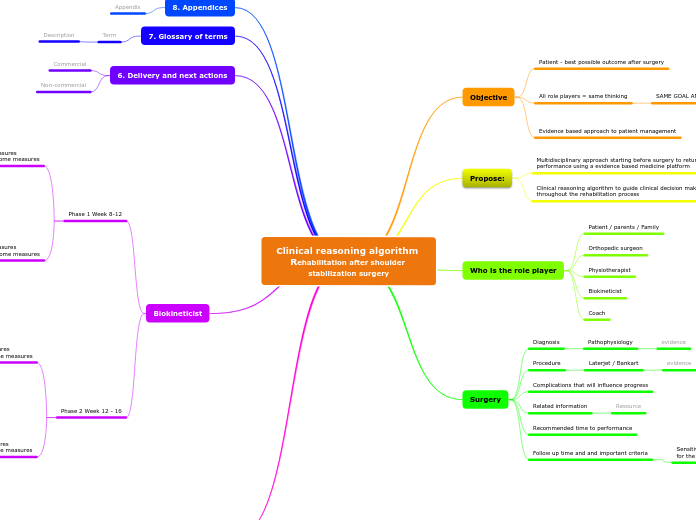Clinical reasoning algorithm Rehabilitation after shoulder stabilization surgery
Objective
Patient - best possible outcome after surgery
All role players = same thinking
SAME GOAL AND KNOW WHAT THE GOAL IS
Return to previous levels of daily activity Return to participation
Return to sport
Return to Performance
With a reduced risk of re-injury
Evidence based approach to patient management
Propose:
Multidisciplinary approach starting before surgery to return to performance using a evidence based medicine platform
Clinical reasoning algorithm to guide clinical decision making throughout the rehabilitation process
Who is the role player
Patient / parents / Family
Orthopedic surgeon
Physiotherapist
Biokineticist
Coach
Surgery
Diagnosis
Pathophysiology
evidence
Procedure
Laterjet / Bankart
evidence
Complications that will influence progress
Related information
Resource
Recommended time to performance
Follow up time and and important criteria
Sensitive indicators / feedback
for the surgeon
8. Appendices
Appendix
7. Glossary of terms
Term
Description
6. Delivery and next actions
Commercial
Non-commercial
Biokineticist
Phase 1 Week 8-12
Primary Outcome Measures
Patient reported outcome measures
WOSI
SIRSI
VAS during provocative test
Secondary Outcome Measures
Performance based outcome measures
ROM
- Easy angle digital goniometer
GHJ
- Internal rotation
- External rotation
- Total arc
= NORM FOR DIFFERENT SURGERIES / SPORT
STRENGTH
- Easy force muscle strength dynometer
- Biodex
- Theraband
RC Muscles
- External rotators
- Internal Rotators
Phase 2 Week 12 - 16
Primary Outcome Measures
Patient reported outcome measures
WOSI
SIRSI
VAS during provocative test
Secondary Outcome Measures
Performance based outcome measures
ROM
- Easy angle digital goniometer
GHJ
- Internal rotation
- External rotation
- Total arc
= NORM FOR DIFFERENT SURGERIES / SPORT
STRENGTH
- Easy force muscle strength dynometer
- Biodex
- Theraband
RC Muscles
- External rotators
- Internal Rotators
Physiotherapy
Alternative
